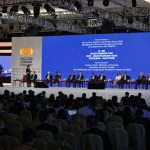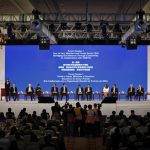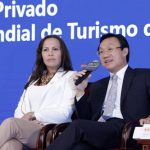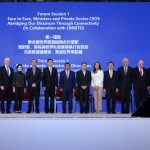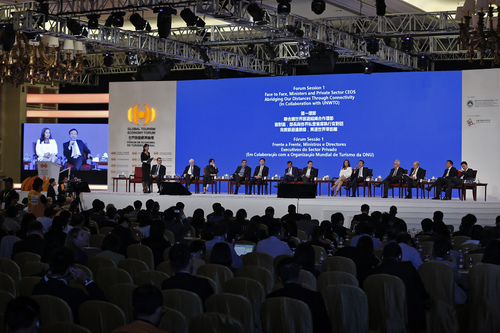 Face to face with Dr. Tam
Face to face with Dr. Tam
The Global Tourism Economy Forum (“GTEF” or “the Forum”), an annual mega event for the tourism industry, resumed its second-day program today (13 October). Themed as “Belt and Road Initiative: Unleashing the New Dynamics of Cultural Tourism”, the Forum put on a range of forward-thinking discussions on ways to foster cooperation between culture and tourism for economic growth under the context of the Belt and Road Initiative. This Forum edition renews its collaboration with the World Tourism Organization (UNWTO) in co-organizing the much anticipated Face to Face, Ministers and Private Sector CEOs session, featuring direct dialogue between Asian and Latin American tourism ministers and private leaders from globally‐renowned corporations. With an UNWTO estimate on expected international tourist arrivals to reach 1.8 billion by 2030, and almost 40% of the tourists traveling on a cultural motivation, the session initiated discussion on how tourism leaders in the public and private sectors can build on the momentum started by the Silk Road tourism and incorporate the Belt and Road initiative to unleash the dynamics of cultural tourism, optimize software and hardware connectivity, and reinvent cross-regional connections of historical and cultural roots, in order to make the topic “Abridging our Distances through Connectivity” come true in the world. Headlined by lead speaker Dr. Taleb Rifai, Secretary-General of UNWTO, the dialogue was joined by dignitaries including Mr. Thong Khon, Minister of Tourism, the Kingdom of Cambodia; Ms. Sandra Howard Taylor, Vice Minister of Commerce, Industry and Tourism, Colombia; Mr. Du Jiang, Vice Chairman of China National Tourism Administration; Dr. Alexis Tam, Secretary for Social Affairs and Culture of the Macao SAR Government; Mr. Alejandro Schiavi, Undersecretary of Coordination, Ministry of Tourism, Argentina; Mr. Rodolfo López Negrete Coppel, Chief Executive Officer of Mexico Tourism Board, as well as private leaders like Ms. Pansy Ho, Managing Director of Shun Tak Holdings Limited; Mr. Gerald Lawless, President and Group Chief Executive Officer of Jumeirah Group; Mr. Peter Meier, Chief Executive Officer of Kuoni Group; Mr. Qian Jiannong, Vice President of Fosun Group; Mr. Francisco Silva Silva, Chairman of the Board of Grupo Security and Mr. Zhang Ling, Chairman of HNA Tourism Group Co. Ltd. On the issue of how public and private sectors can create synergy between Silk Road tourism and Belt and Road initiative, lead speaker of the Session Dr. Taleb Rifai, Secretary-General of UNWTO and Honorary Chairman of GTEF said, “Culture and tourism public and private sectors should work together towards promoting governance models and initiatives and also promoting culture as a means to add value to the tourism experience.” During the session, Dr. Alexis Tam, Secretary for Social Affairs and Culture of the Macao SAR Government elaborated the city’s historic and cultural roots, which can make a strong tie that connects Macao with peoples of different regions around the world, with more friendly visits, exchanges and cooperation based on Macao’s diverse cultural gems, such as cultural heritage, religion, Macanese community, returned overseas Chinese and immigrants as well as historic connections with Portugal. This was followed by the Technical Presentation on Joint Research Project of UNWTO and GTERC. Co-presented by Mr. John Kester, Director of Tourism Market Trends Programme, UNWTO; and Ms. Maria Helena de Senna Fernandes, Director of Macau Government Tourist Office, a broader scope of study comprising market analysis of Asia Tourism trends, specific highlights on the Pacific Alliance countries and the linkage between urban tourism and culture were presented. The Presentation familiarized delegates on the latest tourism market development.
View gallery

